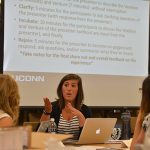Massachusetts requires public schools to have an anti-bullying plan — the result of a 2010 law passed in reaction to the suicides of two students who reportedly had been victims of bullying. George Sugai, co-director of the National Center of Positive Behavioral Interventions and Supports and a professor at the University of Connecticut Neag School of Education, said research shows that “if classrooms and schools are positive, safe, and caring, [the] likelihood of bullying decreases.”
In a new report issued Aug. 10, the National Commission on Teaching and America’s Future (NCTAF) calls for reorganizing schools to better cultivate deep learning for all students. The report, What Matters Now: A New Compact for Teaching and Learning, lays out an ambitious vision for educator-driven improvements buttressed by a coordinated system of policy and community supports.
This past July on the Storrs campus, 11 current teacher leaders representing 10 school districts from across the state spent five days engaged in a variety of learning activities during the inaugural Teacher Leadership Academy. The academy, hosted by the Neag School of Education from July 25-29, 2016, and co-directed by assistant professors Rachael Gabriel, Jennie Weiner, and Sarah Woulfin, was designed to enhance participants’ ability to support high-quality instruction, create conditions for reform, and lead change in Connecticut schools.
This blog discusses Professor James Kaufman’s research and talks about how creativity may be a useful tool for social justice.
Colleges across the U.S. have been trying to do a better job of making students who have traditionally been underrepresented on campus feel welcome and included. But some of their attempts, however well-intentioned, garner as much ire as support. While many see the creation of safe spaces for black students, LGBT students, and other minorities as a positive step toward helping them navigate campus, others see it as resegregation and a step backward.
Last week, the National Commission on Teaching & America’s Future (NCTAF) released a report aimed at helping educators reorganize the nation’s education system in ways that support teaching, drive learning, and provide all students with the foundation needed to build a successful future. Building on a report the Commission issued 20 years ago, it addresses current challenges facing the nation’s educators and makes recommendations focused on improving teaching and learning in the U.S.
Professor Richard Schwab, former dean of the Neag School and now Raymond Neag Endowed Professor of Educational Leadership, helped shape the new report, “What Matters Now: A New Compact for Teaching and Learning.” He describes it as a call to collective action ultimately intended to ensure that all students have access to great teaching.
Two Neag School faculty members in the Department of Educational Leadership have recently received funding — totaling more than $2 million — from the U.S. Department of Education’s Institute of Education Sciences (IES), as part of the latest round of grants issued by the National Center for Education Research (NCER)’s Education Research Grants Program.
Interim Superintendent of Schools Dr. Sal Corda has announced the appointment of Thomas “Tom” C. Healy as the interim principal for Central Middle School effective Aug. 26.
What if we, as instructional leaders, supported creativity in teaching and learning? I mean really supported it. In short, we would see ourselves taking beautiful risks. Creativity expert and professor Ron Beghetto pens this blog post.
With 80 students currently majoring in the University’s human rights undergraduate program and another 40 to 50 enrolled as human rights minors, UConn stands out as one of just a handful of universities in the nation offering a degree program in the field of human rights.
But educating students in human rights issues need not be exclusive to college campuses, as Glenn Mitoma, assistant professor of human rights and curriculum and instruction, can attest.




